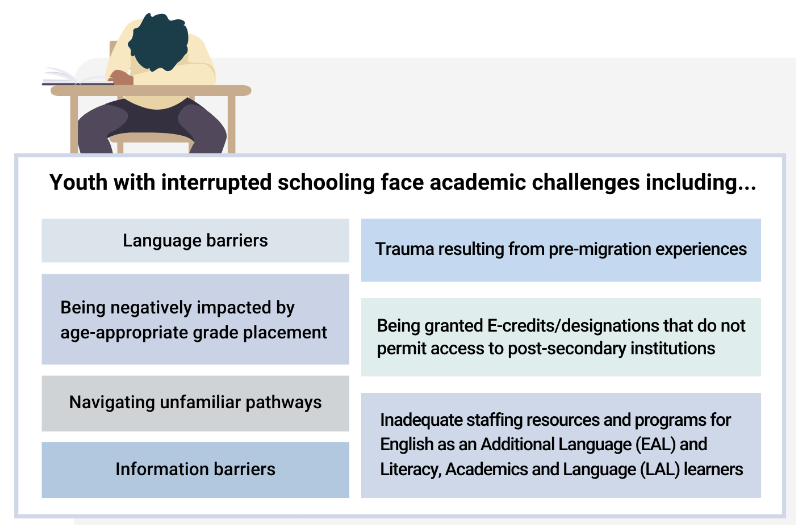Refugee Youth and Interrupted Schooling in Small Centres
Researchers: Ray Silvius1, Kim Browning1, Kathleen Vyrauen2, Don Boddy3
Affiliation: University of Winnipeg1, Immigration Partnership Winnipeg (IPW)2, Manitoba Association of Newcomer Serving Organizations (MANSO)3
Research Partner: Newcomer Education Coalition (NEC), IPW, MANSO, Migration in Remote and Rural Areas Network (MIRRA Network), Community Engaged Research on Immigration Network (CERI)
Keywords: Refugee youth, interrupted schooling, Manitoba, small centres, supports, education, settlement
Summary
Objective: This study built on a previous CYRRC project and the partnerships established with IPW, MANSO, and NEC to explore interrupted schooling among youth with refugee experience in smaller Manitoba communities.
Objective: To understand what practices exist within Manitoban small centre schools to address interrupted schooling for refugee youth, how small centres, educators, and families can be better supported to connect older refugee youth to classrooms to prevent further interrupted schooling, and the relationship between the formal education system and wider resettlement environment in small centres.
Research Justification: It is crucial to share the many stories coming from smaller communities as they are becoming an increasingly larger part of refugee resettlement. This project aimed to develop local awareness of priorities for developing policies and services to address the continuing needs of refugee youth with interrupted schooling.
Infographic Excerpt

Methodology
Small communities were broadly defined as those with a population of 55,000 or less. Data was collected from smaller communities in three geographic regions in Manitoba that had higher concentrations of refugee youth and a federally funded settlement service provider with Settlement Workers in Schools (SWIS) program. The three regions included Central Plains, Pembina Valley, and Westman.
The research team gathered data through semi-structured interviews with 11 refugee youth, 2 school administrators, and 6 educators (mostly English as an Additional Language (EAL) teachers) and through 2 interviews and a focus group with 4 SWIS. A research steering committee and a community-based advisory committee with regional representation of members from education and refugee settlement backgrounds helped guide the study from the early stages of research design.
Findings
Youth with Refugee Experience:
- Many youth reported having limited or no formal schooling experiences before arriving in Canada. Some participants who attended school in refugee camps reported overcrowding and punishment used as a form of discipline.
- These youth face academic challenges including language barriers, being negatively impacted by age-appropriate grade placement, inadequate staffing resources and programs for EAL and Literacy, Academics and Language (LAL) learners, being granted E-credits/designations that do not permit access to post-secondary institutions, navigating unfamiliar pathways, and information barriers.
- Older youth experience a considerable increase in family responsibilities following migration, becoming interpreters, service navigators, and caretakers for their families. The immediate need to earn a living often overshadows longer-term goals of gaining further education and developing English language skills which leads to lower income and fewer advancement opportunities over time.
- Youth who have experienced or witnessed traumatic events in refugee camps or in conflict zones may develop psychosocial challenges including post-traumatic stress disorder.
- Some psychosocial challenges experienced by youth in the study included triggering events, isolation, loneliness, difficulty forming friendships, racism and bullying, a need for safe spaces, and a reluctance to access mental health services.
- Despite the many challenges that youth with refugee experience may face, study participants were optimistic, ambitious, motivated in their learning, and had high expectations for their future.
Smaller Communities:
- The impending arrival of refugees to smaller communities awakened a strong public response with many local stakeholders joining together. These included schools, educational institutions, municipalities, church groups, private businesses, and volunteer networks. The full mobilization of public supports is necessary in smaller communities that have fewer newcomer- and refugee-specific services.
- SWIS play a vital role in supporting the successful integration of refugees and their families into the community. SWIS are generally one of the first points of contact to help families settle and connect with services.
- Educators are invaluable in helping students adjust and in creating a safe and welcoming space. They are advocates for their students and provide an important link between youth and their families and supports offered in the wider community by providing referrals to appropriate services.
- Participants identified gaps in services and supports that pose serious barriers in smaller communities. Adequate services and supports are critical for youth to make successful transitions through the education system to their future goals and long-term integration.
Recommendations
- More funding is needed for EAL programs and staff, SWIS staff, culturally appropriate mental health services, professional development opportunities for school staff and administrators, and to expand academic and bridging programs, after-school programs, and intensive arrival orientation.
- Educators and school principals need to expand information and education outreach so that students with interrupted schooling are better informed about the benefits and limitations of e-credits in completing their education and fulfilling career aspirations.
- There is a need to identify role models and mentors to help refugee youth navigate educational pathways and reduce information barriers.
- Collaborations among governments, schools, and community stakeholders should be formed to work on issues such as the grade placement policy, the pace of covering curriculum content, the need for smaller communities to improve retention of newcomer youth, and implementing employment equity policies to ensure youth feel represented in their classrooms.
- Effective program models and teaching tools that educators used to help refugee youth with academic and social integration within their school community included the EAL Bridging and Transitioning Program for Newcomer Youth at Prairie Hope High School, the “While You Were at School” Narrative Writing Project, and student presentations based on the book, Refugee by Alan Gratz. There is a need for greater access to technology-based programs, an onsite school for language learners, an intensive orientation program, and more opportunity for teachers to work with students individually.
Publications & Reports
Explore more projects


